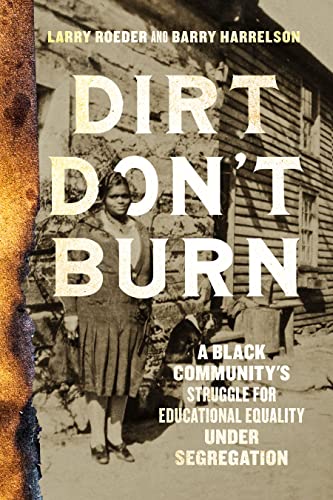Dirt Don’t Burn

Related Links
Fall 2023 Catalog, Georgetown University Press
Book References
Please Contact us if you would like to request a certain official archive document that is referenced in the Dirt Don't Burn book.
Colored schools often had to struggle for the most basic of services. While white children rode buses and wagons, “colored” were relegated to foot traffic until 1941. At Bull Run, every morning each boy brought a lump of coal to the classroom, because coal wasn’t provided by the school system, and others had to walk to a nearby stream to bring buckets of water for the children to drink. One day in the early 1950’s at Wellsville school in far western Loudoun, instructor Ethel Smith, tired of not having any wood or coal, wrote to the Superintendent to complain that dirt didn’t burn. In the vernacular “dirt don’t burn” has become a vivid statement about the inequity of resources provided Blacks. To be fair, resources provided white schools were also often limited, due to budgetary constraints; but as even the Superintendent implied in a famous memo to the school board, equality between the races was so bad, he feared that the courts would take over, as did happen eventually under Brown vs Board of Education.
Inequality was a matter of policy, and the Black community resisted. In honor of Ms. Smith's brave statement and the peaceful resistance to segregation by the entire Black community and their friends, our written report, which will emerge in 2023 published by Georgetown University Press, is called Dirt Don’t Burn. It is now for sale on Amazon.com.
The system of educational apartheid that existed in the United States until the Brown v. Board of Education decision and its aftermath has affected every aspect of life for Black Americans. Dirt Don't Burn is the riveting narrative of an extraordinary community that overcame the cultural and legal hurdles of systematic racism. Dirt Don’t Burn describes how Loudoun County, Virginia, which once denied educational opportunity to Black Americans, gradually increased the equality of education for all children in the area. The book includes powerful stories of the largely unknown individuals and organizations that brought change to enduring habits of exclusion and prejudice toward African Americans.
Dirt Don't Burn sheds new light on the history of segregation and inequity in American history. It provides new historical details and insights into African American experiences based on original research through thousands of previously lost records, archival NAACP files, and records of educational philanthropies. This book will appeal to readers interested in American history, African American history, and regional history, as well as educational policy and social justice.